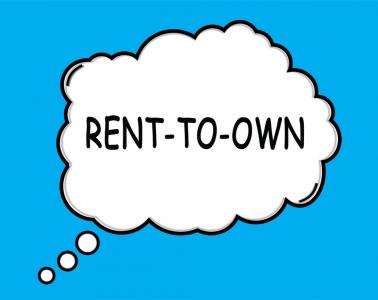
Is a Rent-to-Own Home a Good Option?
Scenario: A buyer is eager to purchase a home, but needs more time to qualify for a mortgage. A seller is eager to generate income on a vacant property. For this buyer and seller, a rent-to-own contract may be an attractive alternative to an immediate transaction.
Offered by individual sellers, and occasionally by developers of multi-unit properties, rent-to-own contracts typically include an up-front fee, plus monthly payments comprised of two components—rent and additional charges that count towards a down payment.
For example, assume you agree to buy a $195,000 home, paying $3,000 up front and monthly payments of $1,400 ($400 of which accumulates toward the sale price). At the end of a one-year contract, you'd accumulate $7,800 towards a down payment; $17,400 after three years.
But if you decide not to proceed on the purchase, it is unlikely that any of your beyond-rent payments will be refunded. For this reason, buyers should only consider a rent-to-own option if they are very serious about purchasing a home, but need more time to arrange financing or have other legitimate reservations.
Rent-to-own contracts may be a good choice if:
• A buyer wants to take advantage of an attractive selling price, but needs more time to save enough for the down payment.
• An interested buyer needs time to improve their credit history and qualify for a better mortgage interest rate.
• A buyer wants to make certain a house has no serious flaws, or wants to experience living in a neighborhood before becoming an owner. If this buyer decides not to proceed, they may forfeit the money credited to a purchase, but these losses could be small compared to the potential cost of multiple real estate transactions and/or property repairs in order to resell the house and find a different home.
In all cases, buyers should plan carefully and make every attempt to ensure they can complete a purchase transaction at the conclusion of the contract. It's also essential to work with a qualified real estate attorney to make sure the contract terms are favorable to your needs and the seller is a legitimate owner.
Potential Pitfalls
Interest rates increase. If rates rise, higher monthly payments could make it harder to secure financing at the conclusion of the rent-to-own contract.
Prices change. If market prices decline, will you be stuck paying a premium price for the home? Conversely, if prices rise, does your contract provide protection from the seller seeking a different buyer?
Late payments. Some contracts say that if payments aren't received on time, they don't count towards the down payment.
Foreclosure scams. Make sure the seller isn't going through foreclosure. You don't want to make inflated payments, only to be served eviction papers when a bank takes possession of the property.
A rent-to-own contract isn't right for every buyer. But in some cases, it can be an attractive option. If you think rent-to-own may be right for you, talk to an Accredited Buyer's Representative. They can help answer your questions, find suitable properties, and direct you towards expert legal counsel.
